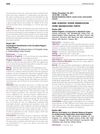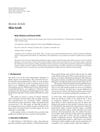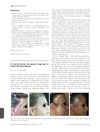 21 citations,
May 2021 in “Prostate Cancer and Prostatic Diseases”
21 citations,
May 2021 in “Prostate Cancer and Prostatic Diseases” COVID-19 might worsen symptoms and progression of benign prostatic hyperplasia, possibly due to inflammation and metabolic disturbances in the prostate gland. More research is needed to confirm this.

The data suggests that dosing differences can help manage spasticity in patients with upper motor neuron dysfunction.
[object Object]  85 citations,
December 2017 in “Developmental Biology”
85 citations,
December 2017 in “Developmental Biology” Mammals might fail to regenerate not because they lack the right cells, but because of how cells respond to their surroundings, and changing this environment could enhance regeneration.
 January 2023 in “Brazilian Journals Editora eBooks”
January 2023 in “Brazilian Journals Editora eBooks” Psychiatrists are crucial in pain management teams because they help treat severe pain and related mental health issues.
 1057 citations,
November 2011 in “Annals of Biomedical Engineering”
1057 citations,
November 2011 in “Annals of Biomedical Engineering” Low-level Laser Therapy may help reduce inflammation, pain, and aid healing, but more research is needed to confirm its effectiveness and establish standard treatment guidelines.
 475 citations,
January 2016 in “International Review of Psychiatry”
475 citations,
January 2016 in “International Review of Psychiatry” The document concludes that non-binary individuals need compassionate support and recognition in healthcare, without being pathologized.
 16 citations,
March 2018 in “Plastic and Reconstructive Surgery – Global Open”
16 citations,
March 2018 in “Plastic and Reconstructive Surgery – Global Open” Early surgical treatment for severe facial injuries from high-energy impacts leads to better recovery.
 1 citations,
May 2017 in “InTech eBooks”
1 citations,
May 2017 in “InTech eBooks” The document explains the causes, types, diagnosis, and treatments of hair loss, and its psychological impact, especially on women.
 8 citations,
February 2012 in “International Journal of Dermatology”
8 citations,
February 2012 in “International Journal of Dermatology” Runners often face skin problems like blisters and infections, and both prevention and early treatment are important.
 5 citations,
February 2010 in “Expert Review of Dermatology”
5 citations,
February 2010 in “Expert Review of Dermatology” Treating both the mind and skin together, especially by managing stress, can greatly improve outcomes for skin disorders linked to psychological issues.
 2 citations,
January 2023 in “Dermatology practical & conceptual”
2 citations,
January 2023 in “Dermatology practical & conceptual” COVID-19 diagnosis is linked to new or worsening hair diseases, with stress from the pandemic likely contributing.
 54 citations,
September 2012 in “Dermatologic Clinics”
54 citations,
September 2012 in “Dermatologic Clinics” Some medications can cause hair loss, but stopping the drug usually leads to recovery within 3 months.
 51 citations,
January 2004 in “Skin Pharmacology and Physiology”
51 citations,
January 2004 in “Skin Pharmacology and Physiology” The document explains hair growth and shedding, factors affecting it, and methods to evaluate hair loss, emphasizing the importance of skin biopsy for diagnosis.
 48 citations,
May 2013 in “Canadian Medical Association Journal”
48 citations,
May 2013 in “Canadian Medical Association Journal” Primary cicatricial alopecia, a rare disorder causing permanent hair loss, is hard to diagnose and treat, with treatments like anti-inflammatory drugs and steroids offering varied results and no guaranteed cure. Psychological support for patients is important, and future research should aim to identify causes of the condition.
 September 2023 in “medRxiv (Cold Spring Harbor Laboratory)”
September 2023 in “medRxiv (Cold Spring Harbor Laboratory)” Long-COVID has diverse, long-term health impacts, especially in young people.
 18 citations,
July 2007 in “Hair transplant forum international”
18 citations,
July 2007 in “Hair transplant forum international” Platelet-rich plasma may improve healing and hair growth in hair transplant surgery.
 1 citations,
December 2022 in “Life”
1 citations,
December 2022 in “Life” Topical corticosteroids are the main treatment for Erosive Pustular Dermatosis, but recurrence is common after stopping treatment.
February 2024 in “Neurophotonics” Light therapy on the brain shows promise for treating brain diseases and improving brain function.
 December 2024 in “Journal of the International Society of Sports Nutrition”
December 2024 in “Journal of the International Society of Sports Nutrition” Creatine monohydrate is safe and effective for muscle recovery and performance, especially for those with low creatine levels.
 October 2022 in “Journal of ophthalmology”
October 2022 in “Journal of ophthalmology” Light therapy may improve eye conditions by stimulating cell activity and increasing oxygen availability.
 May 2023 in “Antioxidants”
May 2023 in “Antioxidants” Peptides from oysters may safely and effectively heal skin wounds with less scarring.
[object Object]  October 2018 in “InTech eBooks”
October 2018 in “InTech eBooks” The most effective treatments for hair loss are minoxidil, finasteride, PRP, and hair transplants, with steroids and immunosuppressants for autoimmune types.

Chemicals and stem cells combined have advanced regenerative medicine with few safety concerns, focusing on improving techniques and treatment effectiveness.
 1250 citations,
August 2021 in “Scientific Reports”
1250 citations,
August 2021 in “Scientific Reports” COVID-19 leaves 80% of patients with long-term symptoms like fatigue and headaches.
 52 citations,
February 2012 in “Plastic Surgery International”
52 citations,
February 2012 in “Plastic Surgery International” Skin grafting is a key procedure for repairing skin defects, with the success depending on the right graft choice, donor site management, and aftercare.
 50 citations,
May 1999 in “Journal of Reconstructive Microsurgery”
50 citations,
May 1999 in “Journal of Reconstructive Microsurgery” Microsurgical reconstruction effectively covers complex scalp defects but doesn't improve survival for cancer-related cases.
 49 citations,
January 2003 in “American Journal of Clinical Dermatology”
49 citations,
January 2003 in “American Journal of Clinical Dermatology” Effective management of children's hair loss involves accurate diagnosis, various treatments, and supportive care.
 39 citations,
July 2015 in “British Journal of Dermatology”
39 citations,
July 2015 in “British Journal of Dermatology” The pseudo 'fringe sign' can also appear in frontal fibrosing alopecia, not just in traction alopecia, showing that this condition may be more common than thought.
 15 citations,
August 2021 in “Reviews in endocrine and metabolic disorders”
15 citations,
August 2021 in “Reviews in endocrine and metabolic disorders” COVID-19 and hypopituitarism (reduced pituitary gland function) are linked, with the latter's related health issues potentially worsening COVID-19 outcomes, and COVID-19 possibly increasing risk for pituitary complications.
 14 citations,
October 2018 in “Brain Research Bulletin”
14 citations,
October 2018 in “Brain Research Bulletin” Exosomes help nerve fibers grow by affecting specific cell signaling pathways.




























